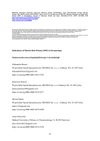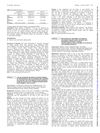 January 2024 in “Wiadomości Lekarskie”
January 2024 in “Wiadomości Lekarskie” Robotic hair transplantation with AI offers more reliable, precise, and efficient hair restoration.
 October 2023 in “Frontiers in medicine”
October 2023 in “Frontiers in medicine” Comprehensive screening for infections is crucial before starting JAK inhibitors in alopecia areata patients.
 September 2023 in “Journal of Education, Health and Sport”
September 2023 in “Journal of Education, Health and Sport” PRP shows promise for skin and hair treatments but needs more research to confirm its effectiveness.

Custom skincare can be made based on genes, fewer cats in Lublin have FeLV/FIV than national average, and studies also looked at small water bodies, river pollution, guppy growth, toxins in biochars, palm oil issues, and pumpkin seed oil for hair strength.

No single biomarker is reliable enough for diagnosing and assessing SLE.
 April 2024 in “Medical & clinical research”
April 2024 in “Medical & clinical research” More research is needed to find the best long-term treatments for Alopecia Areata.
 February 2024 in “Journal of Health Science and Medical Therapy”
February 2024 in “Journal of Health Science and Medical Therapy” ADAM17 could be a potential target for treating PCOS.
 September 2023 in “Fides et Ratio”
September 2023 in “Fides et Ratio” The safety and effectiveness of gender-affirming treatments for children are uncertain, with potential long-term risks like infertility.
 June 2019 in “Poster presentations”
June 2019 in “Poster presentations” Most patients with rheumatoid arthritis continued methotrexate treatment over two years, but those who stopped and restarted experienced more side effects and less improvement.
 January 2018 in “Przegla̧d dermatologiczny”
January 2018 in “Przegla̧d dermatologiczny” The Polish Dermatological Society recommends personalized treatment for cutaneous lupus, including lifestyle changes, medications, and monitoring, with specific drugs for severe cases.
 September 2017 in “Springer eBooks”
September 2017 in “Springer eBooks” PRP injection therapy shows promise for treating hair loss, increasing hair count and thickness with minimal side effects.
 September 2014 in “Springer eBooks”
September 2014 in “Springer eBooks” Men and women experience skin aging differently due to changes in sex hormone levels with age.
January 2024 in “Pharmacoepidemiology” Patients with rheumatoid arthritis using tofacitinib had more serious side effects than those with alopecia areata.
 November 2023 in “Indian Dermatology Online Journal”
November 2023 in “Indian Dermatology Online Journal” Tofacitinib was effective for severe, treatment-resistant hair loss without side effects.
 24 citations,
January 2018 in “International Journal of Trichology”
24 citations,
January 2018 in “International Journal of Trichology” Tofacitinib helped regrow hair in patients with alopecia, with few side effects.
 4 citations,
September 2022 in “Dermatologic Therapy”
4 citations,
September 2022 in “Dermatologic Therapy” Baricitinib helped some patients with tough-to-treat hair loss regrow hair, but more research is needed on its safety.
 November 2024 in “Journal of Cosmetic Dermatology”
November 2024 in “Journal of Cosmetic Dermatology” Baricitinib is effective for severe alopecia areata but has some side effects.
 August 2023 in “Dermatology and Therapy”
August 2023 in “Dermatology and Therapy” Experts recommend personalized treatment plans for best outcomes in managing Alopecia Areata.
227 citations,
April 2020 in “Cell” More precise, personalized therapies are needed for autoimmune diseases.
42 citations,
April 2021 in “JCI insight” Blocking JAK3 signaling can reverse hair loss from alopecia areata.
 11 citations,
November 2017 in “Hong Kong Medical Journal”
11 citations,
November 2017 in “Hong Kong Medical Journal” Polycystic ovary syndrome increases the risk of diabetes, heart disease, and endometrial cancer, and requires early treatment to manage these risks.
 3 citations,
May 2019 in “Ginekologia Polska”
3 citations,
May 2019 in “Ginekologia Polska” Adolescents with abnormal uterine bleeding often have polycystic ovarian syndrome and insulin resistance.
 November 2024 in “SKIN The Journal of Cutaneous Medicine”
November 2024 in “SKIN The Journal of Cutaneous Medicine” Ritlecitinib provides new treatment options for diverse alopecia areata patients.
88 citations,
August 2019 in “Frontiers in immunology” Tyrosine kinases are important in skin autoimmune diseases and could be targets for new treatments.
 52 citations,
January 2022 in “Current Research in Pharmacology and Drug Discovery”
52 citations,
January 2022 in “Current Research in Pharmacology and Drug Discovery” New treatments for COVID-19 show promise, but more effective antiviral drugs are needed.
 50 citations,
February 2013 in “Annals of Clinical Biochemistry”
50 citations,
February 2013 in “Annals of Clinical Biochemistry” Understanding how DHT works is important for diagnosing and treating hormone-related disorders.
40 citations,
June 2021 in “Clinical, cosmetic and investigational dermatology” JAK inhibitors show promise in effectively treating hair loss from alopecia areata.
24 citations,
April 2008 in “Fertility and sterility” Pioglitazone improved insulin sensitivity and altered cortisol metabolism in PCOS patients.
13 citations,
September 2022 in “Frontiers in immunology” Ifidancitinib, a JAK inhibitor, effectively regrows hair in mice with alopecia by tiring out harmful T cells.
 11 citations,
April 2013 in “Hormones”
11 citations,
April 2013 in “Hormones” New information suggests that metformin might help more women with PCOS and infertility, not just those with glucose issues.























